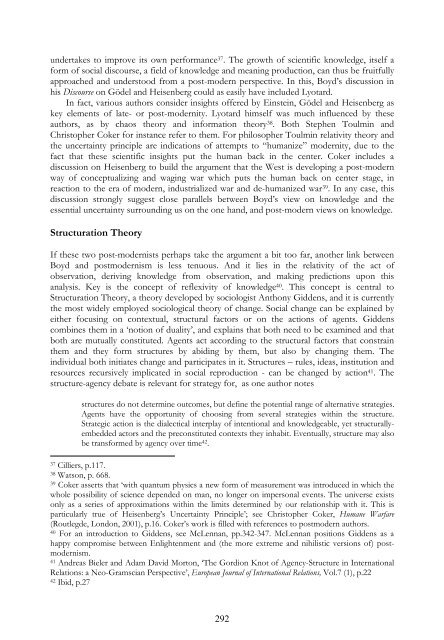Science, Strategy and War The Strategic Theory of ... - Boekje Pienter
Science, Strategy and War The Strategic Theory of ... - Boekje Pienter
Science, Strategy and War The Strategic Theory of ... - Boekje Pienter
Create successful ePaper yourself
Turn your PDF publications into a flip-book with our unique Google optimized e-Paper software.
undertakes to improve its own performance 37 . <strong>The</strong> growth <strong>of</strong> scientific knowledge, itself aform <strong>of</strong> social discourse, a field <strong>of</strong> knowledge <strong>and</strong> meaning production, can thus be fruitfullyapproached <strong>and</strong> understood from a post-modern perspective. In this, Boyd’s discussion inhis Discourse on Gödel <strong>and</strong> Heisenberg could as easily have included Lyotard.In fact, various authors consider insights <strong>of</strong>fered by Einstein, Gödel <strong>and</strong> Heisenberg askey elements <strong>of</strong> late- or post-modernity. Lyotard himself was much influenced by theseauthors, as by chaos theory <strong>and</strong> information theory 38 . Both Stephen Toulmin <strong>and</strong>Christopher Coker for instance refer to them. For philosopher Toulmin relativity theory <strong>and</strong>the uncertainty principle are indications <strong>of</strong> attempts to “humanize” modernity, due to thefact that these scientific insights put the human back in the center. Coker includes adiscussion on Heisenberg to build the argument that the West is developing a post-modernway <strong>of</strong> conceptualizing <strong>and</strong> waging war which puts the human back on center stage, inreaction to the era <strong>of</strong> modern, industrialized war <strong>and</strong> de-humanized war 39 . In any case, thisdiscussion strongly suggest close parallels between Boyd’s view on knowledge <strong>and</strong> theessential uncertainty surrounding us on the one h<strong>and</strong>, <strong>and</strong> post-modern views on knowledge.Structuration <strong>The</strong>oryIf these two post-modernists perhaps take the argument a bit too far, another link betweenBoyd <strong>and</strong> postmodernism is less tenuous. And it lies in the relativity <strong>of</strong> the act <strong>of</strong>observation, deriving knowledge from observation, <strong>and</strong> making predictions upon thisanalysis. Key is the concept <strong>of</strong> reflexivity <strong>of</strong> knowledge 40 . This concept is central toStructuration <strong>The</strong>ory, a theory developed by sociologist Anthony Giddens, <strong>and</strong> it is currentlythe most widely employed sociological theory <strong>of</strong> change. Social change can be explained byeither focusing on contextual, structural factors or on the actions <strong>of</strong> agents. Giddenscombines them in a ‘notion <strong>of</strong> duality’, <strong>and</strong> explains that both need to be examined <strong>and</strong> thatboth are mutually constituted. Agents act according to the structural factors that constrainthem <strong>and</strong> they form structures by abiding by them, but also by changing them. <strong>The</strong>individual both initiates change <strong>and</strong> participates in it. Structures – rules, ideas, institution <strong>and</strong>resources recursively implicated in social reproduction - can be changed by action 41 . <strong>The</strong>structure-agency debate is relevant for strategy for, as one author notesstructures do not determine outcomes, but define the potential range <strong>of</strong> alternative strategies.Agents have the opportunity <strong>of</strong> choosing from several strategies within the structure.<strong>Strategic</strong> action is the dialectical interplay <strong>of</strong> intentional <strong>and</strong> knowledgeable, yet structurallyembeddedactors <strong>and</strong> the preconstituted contexts they inhabit. Eventually, structure may alsobe transformed by agency over time 42 .37 Cilliers, p.117.38 Watson, p. 668.39 Coker asserts that ‘with quantum physics a new form <strong>of</strong> measurement was introduced in which thewhole possibility <strong>of</strong> science depended on man, no longer on impersonal events. <strong>The</strong> universe existsonly as a series <strong>of</strong> approximations within the limits determined by our relationship with it. This isparticularly true <strong>of</strong> Heisenberg’s Uncertainty Principle’; see Christopher Coker, Humane <strong>War</strong>fare(Routlegde, London, 2001), p.16. Coker’s work is filled with references to postmodern authors.40 For an introduction to Giddens, see McLennan, pp.342-347. McLennan positions Giddens as ahappy compromise between Enlightenment <strong>and</strong> (the more extreme <strong>and</strong> nihilistic versions <strong>of</strong>) postmodernism.41 Andreas Bieler <strong>and</strong> Adam David Morton, ‘<strong>The</strong> Gordion Knot <strong>of</strong> Agency-Structure in InternationalRelations: a Neo-Gramscian Perspective’, European Journal <strong>of</strong> International Relations, Vol.7 (1), p.2242 Ibid, p.27292
















